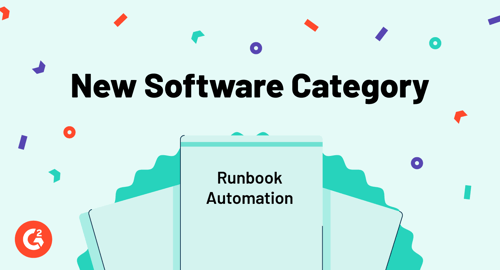IT management demands efficient automation.
When IT professionals create a runbook, they can reuse it in the future to automatically complete repetitive IT tasks. However, when multiple runbooks are created, managing them becomes a challenge.
Hence, IT professionals use automation software to execute specific runbooks based on various IT requests.
G2 launched the Runbook Automation (RBA) Software category in December 2023. The category represents products with a primary goal of streamlining IT process automation.
What is runbook automation software?
Runbook automation software automates operational IT processes with a focus on designing, documenting, and executing runbooks. IT professionals use these tools to efficiently manage routine administrative tasks, including patching, provisioning, and scheduled maintenance.
Common RBA software features include automated script execution to handle recovery, backup, restarts, updates, deployments, and other regular maintenance checks. They also can include multiple scripting language support, integration with existing tools, and customizable runbook templates.
The IT Ops team can tailor their RBA tool to specific environments, including Linux, Windows, MacOS, and other cloud-based systems.
Runbook automation vs. workload automation
RBA tools are designed for system administrators, network engineers, and other IT administrators to provide them with a quick tool to solve simple problems.
Unlike the workload automation (WLA) software, runbook automation software is tailored for IT operations with less complexity and in one environment.
RBA software often comes with a library of prebuilt runbook templates. This lets users quickly set up and automate various repetitive, manual tasks. With WLA software, users might need to spend additional time and effort to connect different environments and systems during the setup process.
As many modern RBA tools are becoming WLA tools because of feature and functionality improvements, software buyers should research both RBA and WLA software before making a purchase decision.
Top five runbook automation products by G2 Scores
G2 provides comprehensive review data to recommend the best runbook automation products for software buyers. As of 17 January 2024, there are 13 products with 207 software reviews in the Runbook Automation category on G2.
Based on their G2 Scores, below are the top five runbook automation software products.
Red Hat Ansible Automation Platform (4.5 stars, 57 reviews) ranks first in G2 Score, followed by PagerDuty (4.5 stars, 74 reviews), Azure Automation (4.5 stars, 19 reviews), Tidal Automation (4.7 stars, 13 reviews), and VMware Aria Automation Orchestrator (4.1 stars,14 reviews).
If you're wondering how the G2 Score is calculated, G2 uses a proprietary algorithm based on G2 reviews, online sources, and social networks. The algorithm produces a standardized score used to compare products within the same category.
So, if you are interested in purchasing runbook automation software products based on G2’s recommendations, be sure to check these products above.
The future of G2's Runbook Automation category
While the runbook automation industry is mature, we expect to add more products with AI functionality to this category in 2024.
This category is heavily influenced by AI development. Some runbook automation tools already use natural language processing (NLP) and machine learning (ML) to categorize the ticket context, identify the most relevant workflow based on the context, and execute the runbook automatically without human interaction.
Keep an eye out for more new products with AI-powered features that could be added later this year.
Learn more about workflow automation, along with its benefits and best practices.
Edited by Jigmee Bhutia


 by Tian Lin
by Tian Lin
 by Tian Lin
by Tian Lin
 by Tian Lin
by Tian Lin